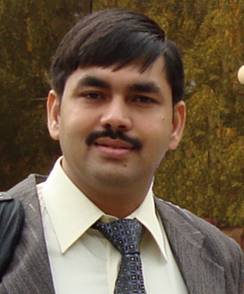Expert Lecture on "Why Deep Learning for Time Series Signal Processing?"
CIS Chapter, IEEE UP Section (CIS11) organized a Lecture Series on "Computational Intelligence". The speaker of the lecture was Prof. Vrijendra Singh, Dept. of Information Technology, Indian Institute of Information Technology Allahabad, Prayagraj, India.
Date and Time
Location
Hosts
Registration
-
 Add Event to Calendar
Add Event to Calendar
Speakers
 Vrijendra Singh of Indian Institute of Information Technology Allahabad, Prayagraj, India
Vrijendra Singh of Indian Institute of Information Technology Allahabad, Prayagraj, India
Why Deep Learning for Time Series Signal Processing?
Biography:
Vrijendra Singh is working as Professor at the Dept. of Information Technology, Indian Institute of Information Technology Allahabad, Prayagraj, India. He received his Ph.D. degree in the area of Machine Learning & Signal Processing from Dayalbagh Educational Institute, Agra, India in the year 2008. He has over 19+ years of experience in academics (teaching/training), research & development and consulting. He has also worked at Dept. of Electrical Engineering, IIT Kanpur as Senior Project Associate, Ecole Polytechnique Federale de lausanne (EPFL), Switzerland as Visiting Research Faculty and was consultant to Putera Sampoerna Foundation, Jakarta (2012) for Course curriculum development in IT and allied areas. He has been conferred with the “50 Fabulous Edutech Leaders Award'' at the 8th World Education Congress, Mumbai, India in the year 2019.
He has developed various intelligent systems/softwares for Indian Industries/ Research Organisations like TVS Motors Company, BARC, ISRO, SAIL, IOCL, NPTEL etc. He has transferred technology to TVS Motors Co. Hosur, India for testing of two wheelers engine during assembly line based on acoustics data analytics in the year 2009. He has successfully deployed a system (under Government of India & National Science Foundation (NSF) USA sponsored joint Project, 2013-2015) for Classification/Protection of Wildlife & Humans, Virtual Fencing, Gunshot Detection & Localisation using IOT devices & Sensor Communication Networks at Panna Tiger Reserve, Madhya Pradesh, India in collaboration with Indian Institute of Science Bangalore, Wildlife Institute of India Dehradun, the Ohio State University, Cornell University and the University of California, Los Angeles. He has authored over seventy five publications in reputed international journals, conference proceedings/book chapters and edited one book. Currently, he is serving as the Chairman, IEEE Computational Intelligence Society, UP Section, India, Advisor to Network Power Solution Enterprise, New Delhi, India, collaborator to NavAjna Technologies Pvt. Ltd, Hyderabad, India and Consultant to Pragmalytics Technologies, Kochi, India.
Email:
Address:Prayagraj, Uttar Pradesh, India, 211015
Agenda
Abstract of the talk:
From the recent years the Internet of Things is an increasingly becoming integral part of our daily lives. Most of the time, the time series data/signals are generated from these IoT devices. The real time analysis of these signals are very important for ease of doing things and making our lives easier. In this talk, we will first understand what a time series signal is? What are the main sources in the world from which the time series signals are generated? A lot of motivational real examples and AI products and solutions will be explained in order to understand the importance and real use of the time series data analysis. Machine Learning concepts from very basic building blocks to advanced architectures including the Deep Neural Networks will be explained. The classical signal processing methods to analyze the time series data analysis along with its machine learning/deep learning counterpart algorithms will be explained along with the comparison of different state of the art approaches. The research problems of the domain along with the challenges shall also be addressed during the session.

